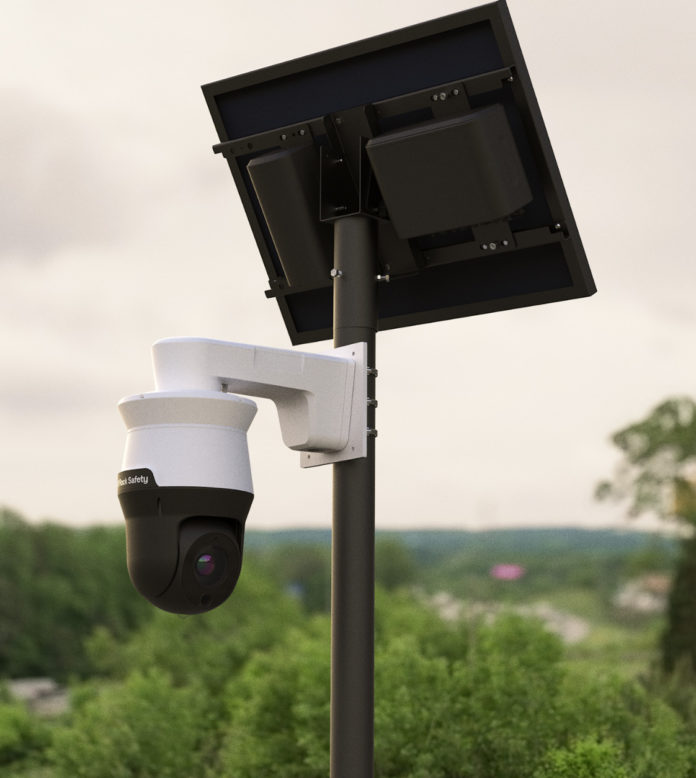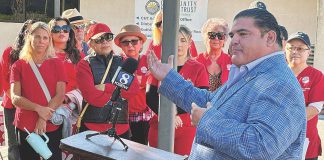The Watsonville City Council on Tuesday renewed the contract for 20 license plate reader cameras—and despite community opposition added 17 additional ones—for a $251,000, two-year contract.
Council members voted 5-2 in favor of the new contract, with Mayor Maria Orozco and Councilwoman Vanessa Quiroz-Carter dissenting.
The issue of using the license plate reader cameras stationed in locations throughout the city has been controversial since 2023, when Watsonville signed a two-year contract with Atlanta, Ga.-based Flock Safety for $132,000 for 20 cameras.
Watsonville Interim Police Chief David Rodriguez said that, with 85% of police agencies across the U.S. facing officer shortages, the Flock cameras are a “true force multiplier” that helps them solve more crimes.
“What this is causing us to do is rethink the way we address policing issues, safety issues in our own community,” Rodriguez said. “A big part of this is using technology.”
According to Rodriguez, police used the cameras 98 times over the past six months for investigations. Incidents of stolen vehicles have decreased by 11% since they were installed, and 28 stolen vehicles have been returned to their owners.
The additional 37 cameras, he said, would help to fill “blind spots” at entrances and exits to the city.
But addressing community concerns, Rodriguez said that the cameras are not used for facial recognition or to monitor speed. More importantly, the data is never shared with federal law enforcement officials, he said.
He explained that officers using the system need a valid reason, as well as a case number. And if a license plate number comes back connected to crimes such as a burglary or a missing person, the system will alert the officer.
“It allows us to better investigate these crimes and actually collaborate with our law enforcement partners to better investigate,” Rodriguez said.
The data is deleted after 30 days, Rodriguez said.
City Attorney Samantha Zutler said that state and local law prevent the data from being shared with outside parties. This includes Senate Bill 54—also called the California Values Act—which limits the way in which law enforcement agencies can cooperate with federal officials.
“The city owns the data, and the city accesses the data,” Zutler said.
But the assurances from the city were cold comfort to several people who spoke against the license plate readers.
Bernie Gomez with Milpa Collective said the cameras will disproportionately impact the people of Watsonville.
He pointed out that Scotts Valley has no cameras, while the city of Santa Cruz, with a population of 56,000 and a majority of white people, has only 8.
“And you have the audacity to want 37,” Gomez said.
Julia Monahan, a founder of Get the Flock Out said the group is working to persuade the county’s jurisdictions that use the cameras to cease their contracts.
The group points out that the city of Denver recently rejected an extension for license plate readers there after a public backlash.
The movement, Monahan said, is not about distrust of the police.
She said Flock has already been accused of sharing data from license plate reader cameras with federal officials in other jurisdictions.
“This is about the tool that’s being used,” she said.
Watsonville Charter School for the Arts teacher Bobby Marchessault said he understands why police would want the tool. But he urged the council to reject the contract.
“I think as a community though it’s also our job to balance that and ask what kind of community we want to live in,” he said. “Do we want to live in a surveillance state community? I don’t think the end is worth the means.”
Quioroz-Carter said that she was a part of the council two years ago when the initial contract with Flock was approved. But that was before President Donald Trump was elected and began to implement his hardline immigration policies.
“The world was a very different place two years ago,” she said, adding that current law is behind in protecting the privacy of citizens.
“Our data is being bought, sold and traded,” she said.
Councilwoman Kristal Salcido, an attorney, said she works with children caught up in human trafficking.
“I am persuaded by the types of crimes that can be solved (by the cameras),” she said. “If my children were to go missing, I would want this type of tool to be able to be used.”














If you want to protect your children then get rid of the sanctuary city, What a screw up answer
You haven’t given.
TALK ABOUT SCREW UP ANSWERS, JIM. THAT WOULD BE YOURS. WATSONVILLE IS A SANCTUARY CITY AND IT SHALL REMAIN SO, DESPITE YOUR FASCIST FRIENDS IN THE WHITE HOUSE
i agree with the Mayor and councilmember Quiroz Carter. the cameras are not going to help. and we do not need to imitate a police state simply because the wannabe HITLER in the White House thinks we need to obey. KISS MY GAY LATINO ASS, DONNIE !
I don,t think it will remain a sanctuary city, Donald Trump is doing a fine job and has no time to kiss your ass.
it seems to me that the City Council don’t care or lessen to their citizens, they always just aprove things, that is not on their Budget, just Cancel the cameras, and save the quarter million dollars.
Steve this is a comment I would not expect out of a Cabrillo College Board Member.
You are an evil person, Steve Trujillo. Educators like you are the reason my kids were home-schooled.
I should not be a judge of morality by any means, but it does seem like openly propositioning the President to give you a rim job is very unprofessional, Mr. Trujillo. It also seems contradictory to your stated feelings about the man. I recommend you spend time getting your emotions in order before posting.
Where are you, Watsonville Mayor and Councilwoman Quiroz Carter? A man of God was just assassinated for practicing his 1st Amendment right.
Do you agree with your supporter Steve Trujillo’s post, continuing to fuel the lies liberals have spread?
Your continued silence speaks volumes about your character. You should resign.